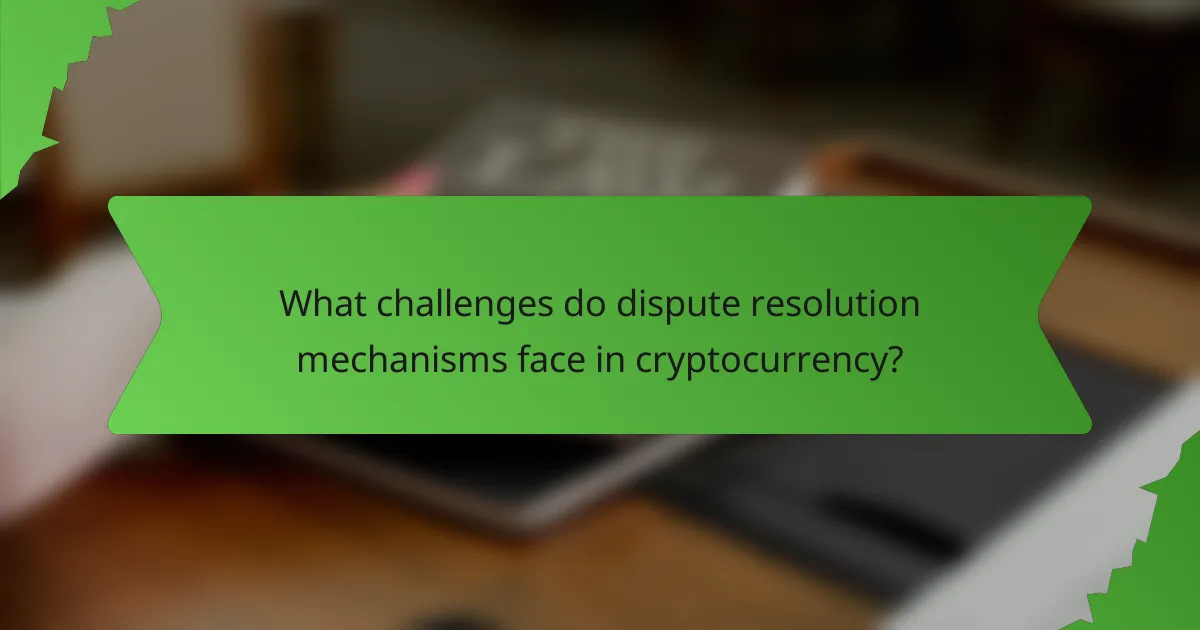Dispute resolution mechanisms for cryptocurrency transactions are essential processes that address conflicts between parties involved in these transactions. Key mechanisms include mediation, arbitration, and decentralized platforms, each offering distinct methods for conflict resolution. The article examines the challenges these mechanisms face, such as the lack of legal frameworks, the pseudonymous nature of transactions, and the rapid evolution of technology. Additionally, it discusses strategies for improving dispute resolution, including clear guidelines, user education, and the use of smart contracts to enhance transparency and accountability. Overall, the article highlights the importance of effective dispute resolution in fostering trust within the growing cryptocurrency market.

What are Dispute Resolution Mechanisms for Cryptocurrency Transactions?
Dispute resolution mechanisms for cryptocurrency transactions are processes designed to resolve conflicts between parties involved in these transactions. Common mechanisms include mediation, arbitration, and decentralized dispute resolution platforms. Mediation involves a neutral third party helping both sides reach an agreement. Arbitration is a more formal process where an arbitrator makes a binding decision. Decentralized platforms utilize smart contracts and community voting to resolve disputes. These mechanisms aim to provide fair outcomes and enhance trust in cryptocurrency transactions. The rise of these mechanisms is essential as the cryptocurrency market grows, with an estimated market cap exceeding $2 trillion in 2021.
How do these mechanisms function in the context of cryptocurrency?
Dispute resolution mechanisms in cryptocurrency function by providing structured processes for addressing conflicts. These mechanisms include smart contracts, mediation, and arbitration. Smart contracts automatically execute agreements based on predefined conditions, reducing disputes. Mediation involves a neutral third party helping the parties reach a mutually acceptable solution. Arbitration is a more formal process where an arbitrator makes a binding decision.
In the cryptocurrency context, these mechanisms enhance trust among users. They provide clear guidelines for resolving issues without traditional legal systems. For example, platforms like Kleros utilize blockchain technology for decentralized arbitration. This ensures transparency and fairness in dispute resolution. Overall, these mechanisms aim to facilitate smoother transactions in the cryptocurrency ecosystem.
What are the key components of these mechanisms?
The key components of dispute resolution mechanisms for cryptocurrency transactions include arbitration, mediation, and smart contracts. Arbitration provides a formal process where an impartial third party makes a binding decision. Mediation involves a neutral facilitator helping parties reach a mutually acceptable agreement. Smart contracts automate and enforce agreements based on predefined conditions. These components ensure efficiency, transparency, and fairness in resolving disputes. Their effectiveness is supported by the increasing adoption of blockchain technology, which enhances trust and reduces fraud in transactions.
How do these components interact during a dispute?
During a dispute in cryptocurrency transactions, the components involved include the parties in conflict, the transaction records, and the dispute resolution mechanism. The parties present their claims based on transaction data. The transaction records serve as the primary evidence for validating each party’s position. The dispute resolution mechanism, which may involve mediation or arbitration, facilitates communication between the parties. This mechanism analyzes the evidence and arguments presented. It aims to reach a fair resolution based on the data and applicable regulations. The effectiveness of the interaction depends on the clarity of the transaction records and the impartiality of the resolution process. Accurate records are crucial for substantiating claims and ensuring a fair outcome.
What types of dispute resolution mechanisms exist for cryptocurrency transactions?
Dispute resolution mechanisms for cryptocurrency transactions include arbitration, mediation, and smart contract-based resolution. Arbitration involves a neutral third party making a binding decision on the dispute. Mediation allows parties to negotiate a solution with the help of a mediator. Smart contracts automate dispute resolution through predefined rules and conditions. Each mechanism addresses different aspects of conflict resolution. Arbitration is legally recognized in many jurisdictions. Mediation offers flexibility and control to the parties involved. Smart contracts enhance efficiency by reducing the need for intermediaries. These mechanisms help ensure fair outcomes in cryptocurrency transactions.
What are the differences between mediation and arbitration in this context?
Mediation and arbitration are two distinct dispute resolution mechanisms. Mediation involves a neutral third party facilitating communication between disputing parties to help them reach a voluntary agreement. The mediator does not impose a decision; rather, they guide discussions to foster understanding and compromise. In contrast, arbitration involves a neutral third party making a binding decision after hearing both sides. The arbitrator evaluates evidence and arguments, then delivers a ruling that the parties must follow. Mediation is typically less formal and more flexible than arbitration, allowing for creative solutions. Arbitration, however, usually follows formal rules and procedures, making it more structured. In cryptocurrency transactions, mediation can allow for faster resolutions and preserve business relationships, while arbitration provides a definitive outcome when parties cannot agree.
How do decentralized platforms handle disputes differently?
Decentralized platforms handle disputes through community-driven mechanisms rather than centralized authorities. These platforms often employ smart contracts to enforce agreements automatically. In the event of a dispute, participants can rely on decentralized arbitration systems. These systems utilize a network of independent arbitrators selected by the parties involved.
Additionally, many decentralized platforms incorporate reputation systems. Users build trust through past interactions, influencing future dispute resolutions. Transparency is another key feature, as all transactions and decisions are recorded on a public ledger. This openness allows for better accountability and trust among users.
Research indicates that decentralized dispute resolution can reduce costs and increase efficiency compared to traditional methods. A study by the Cambridge Centre for Alternative Finance highlights the effectiveness of these systems in managing disputes within cryptocurrency transactions.
Why are dispute resolution mechanisms important for cryptocurrency transactions?
Dispute resolution mechanisms are essential for cryptocurrency transactions because they provide a structured way to address conflicts. These mechanisms help ensure fairness and transparency in transactions. They protect users from fraud and errors, which can occur in the decentralized cryptocurrency environment. For instance, without a resolution process, users may face significant losses due to misunderstandings or malicious activities. Research indicates that 24% of cryptocurrency users have experienced issues with transactions, highlighting the need for effective dispute resolution. Additionally, these mechanisms foster trust among users, encouraging wider adoption of cryptocurrencies. Trust is crucial in a market characterized by volatility and anonymity.
What risks do users face without effective dispute resolution?
Users face significant risks without effective dispute resolution in cryptocurrency transactions. These risks include financial loss due to fraud or theft. Without a mechanism to resolve disputes, users may struggle to recover lost funds. Additionally, users may experience prolonged transaction delays. This can lead to missed opportunities in a volatile market. Trust in the cryptocurrency ecosystem can diminish without reliable dispute resolution. Poor resolution processes can also result in legal complications. Furthermore, users may encounter challenges in establishing accountability among parties. Overall, the absence of effective dispute resolution heightens the risk of negative experiences in cryptocurrency transactions.
How do these mechanisms enhance user trust in cryptocurrency transactions?
Dispute resolution mechanisms enhance user trust in cryptocurrency transactions by providing clear processes for conflict resolution. These mechanisms ensure that users have a reliable way to address issues that may arise during transactions. They typically involve third-party arbitrators or mediation services that help resolve disputes fairly.
The presence of these mechanisms reduces the perceived risk associated with cryptocurrency transactions. Users are more likely to engage in transactions when they know there is a structured way to handle disputes. According to a study by the Cambridge Centre for Alternative Finance, trust is a significant factor in user adoption of cryptocurrencies.
Furthermore, transparent procedures build confidence among users. When users understand how disputes will be managed, they feel more secure in their transactions. This transparency can lead to increased participation in the cryptocurrency market, fostering a more robust and trustworthy ecosystem.

What challenges do dispute resolution mechanisms face in cryptocurrency?
Dispute resolution mechanisms in cryptocurrency face several significant challenges. One major challenge is the lack of legal frameworks governing cryptocurrency transactions. Many jurisdictions have not established clear regulations, leading to uncertainty in resolving disputes. Additionally, the pseudonymous nature of cryptocurrency transactions complicates the identification of parties involved. This anonymity can hinder accountability and make it difficult to enforce resolutions.
Another challenge is the rapid evolution of technology and platforms. As new cryptocurrencies and decentralized systems emerge, existing dispute resolution methods may become outdated. Furthermore, the global nature of cryptocurrency transactions means that jurisdictions may conflict, complicating the enforcement of resolutions across borders.
Finally, the technical complexity of blockchain and smart contracts can create misunderstandings among users. Many users may not fully grasp the technology behind their transactions, leading to disputes that could have been avoided with better education and awareness.
How do legal frameworks impact these mechanisms?
Legal frameworks significantly impact dispute resolution mechanisms for cryptocurrency transactions. They establish the rules and guidelines governing these mechanisms. Clear legal definitions help define the rights and responsibilities of parties involved. This clarity can enhance trust among users and encourage participation in cryptocurrency markets. Additionally, legal frameworks can dictate the enforceability of contracts and agreements. For example, jurisdictions with strong legal protections may attract more users and businesses. Conversely, ambiguous regulations can lead to disputes and hesitance in transaction participation. Overall, the presence or absence of robust legal frameworks shapes the effectiveness and reliability of dispute resolution mechanisms.
What are the regulatory challenges specific to cryptocurrency disputes?
Regulatory challenges specific to cryptocurrency disputes include lack of clear legal frameworks and jurisdictional issues. Many countries have not established comprehensive regulations for cryptocurrencies. This creates uncertainty for stakeholders involved in disputes. Additionally, differing regulations across jurisdictions complicate enforcement of legal decisions. The decentralized nature of cryptocurrencies further complicates accountability and regulation. Many regulatory bodies struggle to keep pace with the rapid evolution of technology. This leads to inconsistencies in how disputes are resolved. Furthermore, there is often a lack of expertise among legal professionals regarding cryptocurrency matters. These challenges hinder effective resolution of disputes in the cryptocurrency space.
How do jurisdictional issues affect dispute resolution?
Jurisdictional issues significantly impact dispute resolution by determining which laws and courts apply to a case. These issues can complicate the enforcement of agreements and the resolution process. For instance, if parties are in different jurisdictions, conflicting laws may arise. This can lead to delays and increased costs in resolving disputes. Furthermore, the lack of a clear jurisdiction can result in forum shopping, where parties seek the most favorable legal environment. In cryptocurrency transactions, the decentralized nature of assets further complicates jurisdictional matters. Cases may involve multiple countries, each with its own regulations. This complexity necessitates a clear understanding of jurisdiction to ensure effective dispute resolution.
What technological barriers exist in dispute resolution for cryptocurrency?
Technological barriers in dispute resolution for cryptocurrency include issues such as lack of standardization. Different blockchain platforms operate using various protocols and rules. This inconsistency complicates the resolution process across platforms. Additionally, the pseudonymous nature of transactions makes it difficult to identify parties involved in disputes. Smart contracts, while automated, can contain coding errors that lead to unintended outcomes. Furthermore, the immutability of blockchain records poses challenges in correcting mistakes. Limited access to technical expertise in blockchain technology hinders effective dispute resolution. Lastly, the rapid evolution of technology can outpace existing legal frameworks, leaving gaps in regulation.
How does the anonymity of blockchain transactions complicate disputes?
The anonymity of blockchain transactions complicates disputes by making it difficult to identify parties involved. This lack of identifiable information hinders accountability. Without knowing who is behind a transaction, proving claims becomes challenging. Disputes often require evidence linking parties to specific actions. Anonymity creates obstacles in gathering this evidence. Additionally, it complicates regulatory oversight and enforcement. Authorities face difficulties in tracing transactions back to individuals. This can lead to unresolved conflicts and potential fraud. Overall, anonymity undermines the effectiveness of dispute resolution mechanisms.
What role does smart contract technology play in dispute resolution?
Smart contract technology automates dispute resolution in cryptocurrency transactions. It executes predefined rules, reducing the need for intermediaries. When conditions are met, the contract self-executes, ensuring compliance. If a dispute arises, the smart contract can reference agreed-upon terms to resolve issues. This process enhances transparency and trust among parties. According to a study by the World Economic Forum, smart contracts can significantly lower transaction costs and time. They provide an immutable record of agreements, which aids in resolving conflicts. This technology streamlines the resolution process, making it faster and more efficient.

What best practices can improve dispute resolution mechanisms for cryptocurrency transactions?
Implementing clear guidelines for dispute resolution can significantly enhance mechanisms for cryptocurrency transactions. Establishing a well-defined process helps users understand their rights and responsibilities. Utilizing decentralized platforms ensures transparency and fairness in resolving disputes. Incorporating smart contracts automates agreement enforcement, reducing the need for intermediaries. Providing access to third-party mediation can facilitate unbiased resolutions. Regularly updating protocols based on user feedback improves the effectiveness of the mechanisms. Educating users about dispute resolution options empowers them to navigate conflicts more effectively. Lastly, leveraging blockchain technology enhances traceability and accountability in transactions, fostering trust among users.
How can users effectively navigate dispute resolution processes?
Users can effectively navigate dispute resolution processes by understanding the steps involved. First, they should gather all relevant documentation related to the dispute. This includes transaction records, communications, and agreements. Next, users must identify the appropriate dispute resolution mechanism. Options may include mediation, arbitration, or direct negotiation.
Users should familiarize themselves with the rules and procedures of the chosen mechanism. This ensures compliance and enhances their chances of a favorable outcome. Additionally, users should clearly articulate their position and desired outcome during the process.
Effective communication is crucial. Users should remain professional and focused on resolving the issue. They may also consider seeking legal advice if the dispute escalates. According to a survey by the International Chamber of Commerce, 85% of businesses find mediation effective in resolving disputes. This highlights the importance of choosing the right approach.
What steps should users take to prepare for potential disputes?
Users should gather all relevant documentation to prepare for potential disputes. This includes transaction receipts, communication logs, and account statements. Users should also familiarize themselves with the terms of service of the cryptocurrency platform they are using. Understanding these terms can clarify the dispute resolution process. Users should keep records of all interactions with the platform. This documentation serves as evidence in case of a dispute. Additionally, users should consider using escrow services for high-value transactions. Escrow can provide an added layer of security. Finally, users should be aware of their legal rights regarding cryptocurrency transactions. Knowing these rights can empower users during a dispute.
How can users choose the right dispute resolution mechanism for their needs?
Users can choose the right dispute resolution mechanism by assessing their specific needs and the nature of the dispute. They should consider the complexity of the issue at hand. Simple disputes may benefit from informal mediation. More complex cases might require arbitration or formal litigation. Users should also evaluate the costs associated with each mechanism. Cost-effective solutions are often preferable for smaller disputes. Additionally, the speed of resolution is critical. Users may prioritize quicker outcomes for urgent matters. Finally, they should review the expertise of the resolution provider. Specialized knowledge in cryptocurrency transactions can enhance the effectiveness of the resolution process.
What future trends are emerging in dispute resolution for cryptocurrency?
Decentralized dispute resolution systems are emerging as a key trend in cryptocurrency. These systems leverage blockchain technology to ensure transparency and impartiality. Smart contracts are increasingly used to automate the resolution process. They can execute predefined actions based on the outcome of disputes. Additionally, the rise of decentralized autonomous organizations (DAOs) is influencing dispute resolution. DAOs can facilitate community-driven decision-making for conflict resolution. Furthermore, the integration of artificial intelligence is expected to enhance efficiency. AI can analyze past disputes to predict outcomes and suggest solutions. Increasing regulatory scrutiny is also shaping the landscape. Regulators are pushing for clearer guidelines on dispute resolution mechanisms. These trends indicate a shift towards more efficient and transparent processes in cryptocurrency dispute resolution.
How is artificial intelligence being integrated into these mechanisms?
Artificial intelligence is being integrated into dispute resolution mechanisms for cryptocurrency transactions through automated decision-making systems. These systems analyze transaction data to identify patterns and anomalies. Machine learning algorithms enhance the accuracy of these analyses by learning from past disputes. Natural language processing aids in understanding user complaints and facilitating communication. AI-driven chatbots provide immediate assistance to users, streamlining the resolution process. Additionally, predictive analytics can forecast potential disputes based on transaction behaviors. This integration improves efficiency and reduces the time required for dispute resolution. Studies have shown that AI can decrease resolution times by up to 50%.
What innovations are being developed to streamline dispute resolution?
Innovations being developed to streamline dispute resolution include blockchain technology and smart contracts. Blockchain provides a transparent and immutable record of transactions, which enhances trust among parties. Smart contracts automate the execution of agreements, reducing the need for intermediaries. These innovations can expedite resolution processes and lower costs. Additionally, artificial intelligence is being integrated to analyze disputes and suggest resolutions based on previous cases. Online dispute resolution platforms are also emerging, allowing parties to resolve issues remotely and efficiently. These advancements collectively aim to make dispute resolution faster, more accessible, and cost-effective in cryptocurrency transactions.
Dispute resolution mechanisms for cryptocurrency transactions are structured processes designed to address conflicts arising between parties involved in these transactions. Key mechanisms include mediation, arbitration, and decentralized platforms utilizing smart contracts. These processes enhance trust and transparency in the cryptocurrency ecosystem by providing clear guidelines for resolving disputes, protecting users from fraud, and ensuring fair outcomes. The article explores the functionality, importance, and challenges of these mechanisms, as well as emerging trends and best practices for effective dispute resolution in the rapidly evolving cryptocurrency landscape.




